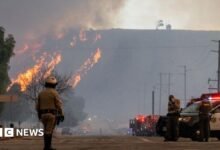Sudan’s el-Fasher siege: Last surgeons standing in city’s only hospital

Dr Mustafa Ali Abdulrahman Ibo and his colleagues bravely perform surgery under increasing bombardment in the last remaining hospital in el-Fasher, a city that has been under siege for the last nine months in Sudan’s western Darfur region.
Over the last month the hospital has recorded 28 deaths and more than 50 injuries among its staff and patients because of intense shelling. This is the highest number of casualties recorded in a month since the siege began.
“Recent continuous attacks targeting Saudi Hospital have intensified dramatically, it has become part of our daily lives,” Dr Ibo, a Darfuri who has lived in el-Fasher since 2011, told the BBC.
He said the most frightening day had been when a team of medics were performing an emergency caesarean as the shelling began – a near-death experience for them all.
”The first one hit the hospital’s perimeter wall… [then] another shell hit the maternity operating room, the debris damaged the electrical generator, cutting off the power and plunging us into complete darkness,” he said.
The surgical team had no option but to use the torches on their phones to finish the two-hour operation.
Part of the building had collapsed and the room was full of dust with shrapnel scattered all over the place.
Dr Khatab Mohammed, who had been leading the surgery, described the dangers.
“The situation was dire, the environment was no longer sterile,” the 29-year-old medic told the BBC.
“After ensuring our safety and the patient’s safety from shrapnel, we cleaned her and changed our surgical gowns since our clothes were full of dust and we continued the surgery,” he said, adding that the patient could have died from complications.
After successfully delivering the baby, the doctors moved mother and new-born to another room to recover and then gathered to take a group photo.
It was a testament to their survival, but Dr Mohammed added: “I thought it might be our last photo, believing that another shell would hit the same spot and we would all die.”
They went on to perform two more life-saving emergency operations that day.
https://ichef.bbci.co.uk/ace/branded_news/1200/cpsprodpb/d865/live/9c690b10-d504-11ef-9fd6-0be88a764111.jpg







